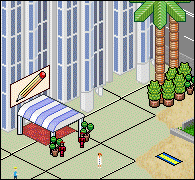Wednesday, February 23, 2005
Deaths RSS
Oh my, an RSS which announces when celebrities die. [Via J-Walk.]
Isometric City

This image of an isometric, pixel-based city contains everything from pharmacy to bowling center and is worth a look or two (the image might need you to zoom in as it’s very large). My colleague is responsible for the blue glass hotel on the left. He was also working on street leading away from it but says unfortunately the city has been closed and doesn’t accept any additions anymore.
Old Screen-Design
A Biased History of Interactive Media, linked from BoingBoing today, contains a lot of 80s and early 90s screen-design samples (you need to open them by clicking the small icons in the text). That, and this quote:
“Low-res requires abstraction, and abstraction requires understanding.
Abstraction amplifies meaning by cutting away noise and leaving only essentials.
Hi-res lets us get away with not abstracting.
Understanding low-res makes our hi-res work better.”
Screen-scraping Google Maps
Interesting: if I understand it right, someone figured out how Google Maps draws lines on maps, and wrote this Perl script to grab an image off of Google Maps to draw any line (like this one). Someone else in the meantime figured out how to grab tiles from Google Maps.
FeedBeep
FeedBeep sends SMS alerts about RSS feeds to a phone. [Via Waxy.]
Generator Blog
The Generator Blog presents nothing but links to online tools generating something. Like the random bar joke generator.
A Google Images World Map?
Here’s an idea I’ve been carrying around for a while, but didn’t yet get to implement it – draw a map of the world by using Google image search results exclusively. What you would need to do this would be a map of coordinates, and for every country, state and bigger city there would be its name (like “Spain” or “New York”). For all of those names, the first image from a Google Images search will be pulled, resized to fit, and pasted on the map – this could be done with HTML and absolute positioning of CSS, along with a little screen-scraping in the back-end. The result would be a visual world map full of random weirdness, fitting imagery, or stereotypes. I know many skilled developers are reading along, so I’d love to hear from you if you can come up with something.
Winer on AutoLinks
Dave Winer of Scripting.com posted his view on the Google AutoLink feature, explaining why he thinks this Google Toolbar 3 feature is going against the nature of the web. It turns out Microsoft with their Smart Tags – which most everyone seemed to oppose back then – were actually presenting a more reasonable way to implement auto-links. They at least gave webmasters a chance to opt-out, and they also formatted their auto-links differently than regular links.
As one solution, Dave suggests to make Google’s AutoLink feature opt-in for webmasters. This would mean we would need to include a meta-tag or specific “robots.txt” syntax to activate this linking feature. While I think this may mean more control for the webmaster, it does sound like it would render the tool useless; like if you would create a text-to-speech browser, but you would need to rely on webmasters to include a special tag so you could actually read the page to the browser.
It’s another question whether or not rendering this tool practically useless is the price we are willing to pay. While the great thing about HTML is that it has a “I just offer my data and suggest a layout, but you do with that what you want” approach, actively remixing content does seem a little spywarish indeed. We need to draw the line where people may confuse responsibilities; when I put my name under the web pages I offer, I want to be responsible to where my links point to.
Update: As Tony Ruscoe points out in the forum, you need to click the “Look for Map” button on the Google Toolbar before any addresses turn to links. And he’s right that this means users won’t be confused as to what’s happening. Additionally, the cursor when moused over Google-inserted addresses will change its icon. Much ado about nothing?
Yahoo Images Updated

Gary Price reports Yahoo updated their image search data. Yahoo now indexes over 1.5 billion images.
Porsche Cayman S
Porsche today unveiled its new car (at least the name and spirit) in a web special.
>> More posts
Advertisement
This site unofficially covers Google™ and more with some rights reserved. Join our forum!
